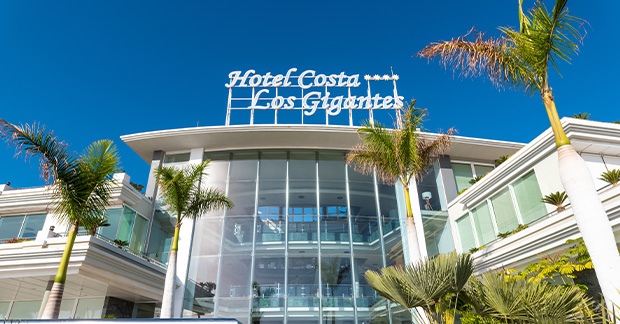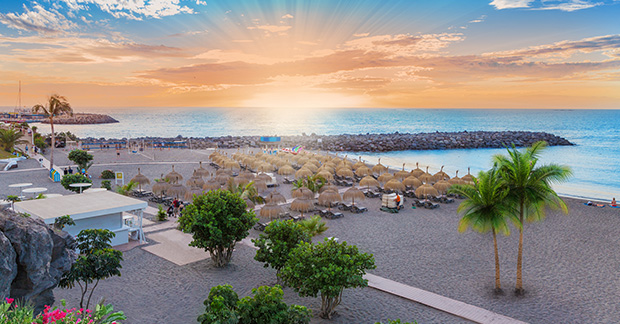An accessible family holiday in the Canary Islands

Finding a holiday for the whole family is a challenge at the best of times – but what if your child has a disability to consider? Claire Naylor finds out on an easyJet Holidays trip to Tenerife
Click here to download and save as a PDF
In the past, I was of the ‘tickets, passport, wallet – go’ attitude to travel. Anything I didn’t have, I could buy or do without. It wasn’t until planning a trip that had to factor in my son’s hidden disability that I realised how much holidaymakers with a health condition have to consider.
Between working out flights that wouldn’t disrupt his routine, factoring in extra costs for travel insurance and making sure that transporting medication across borders wasn’t going to land us in jail, I suddenly had a lot more to think about.
Non-visible disabilities and health conditions include anything from being on the autism spectrum to hearing and vision loss, cognitive impairment such as learning disabilities or dementia, mental health conditions, sensory processing difficulties and even diabetes or chronic pain – all of which can have an impact on what clients need as they travel or when they get to their final destination.
For our family, it was my eight-year-old son’s neurological condition – narcolepsy and cataplexy (sudden muscle weakness) – that we needed to manage.
At home, he has a regular schedule, daytime naps, rigid bedtimes, an exercise regime, strict diet and heavy-duty controlled drugs. Anything that takes him out of his routine can make his symptoms worse, and this was the first overseas holiday for our family of four – including my partner and 12-year-old – since his diagnosis.
But with daytime flights and no change of time zone, the family-friendly resorts of the Canary Islands looked like a destination that would work for us.

Getting special assistance
We knew we’d need support at the airports and wanted to discuss sleeping arrangements, but found it difficult to get any firm details until we had booked – not ideal for travellers who need reassurance that the trip is suitable before they go ahead.
Once our booking was confirmed with easyJet holidays, we spoke to an advisor on the special-assistance team, who listened to my concerns about the layout of the rooms and how my son must have a proper bed – not a pull-out or sofa bed.
These requests were logged, along with the need for special assistance at the airport. At Gatwick, our 1.55pm flight was delayed by an hour, which meant the plan for my son to have his 2pm sleep on the plane was now impossible.
Fortunately, airport assistance includes free-of-charge access to a wheelchair – not an ideal place to sleep, but it meant we could transport him to the gate while he conserved his energy.
Upon arrival in Tenerife, our request for special assistance hadn’t been received, so we waited for the staff to bring a wheelchair, before being guided through the crowds to a priority lane at passport control.

An accessible hotel in Tenerife
The room at the Landmar Costa Los Gigantes was exactly what we needed – there wasn’t much more the resort could have done to accommodate my son’s condition. However, there are many different hidden disabilities to consider, and there are simple things agents can look for when booking.
Speaking about hidden disabilities and inclusive travel at London’s WTM last month, neurodiversity consultant Onyinye Udokporo said: “One of the easiest ways to make a hotel more neuroinclusive is to give people choice.”
That might mean offering control of lights via dimmer switches to help prevent sensory overload, providing weighted blankets in rooms and prioritising clear signage over heavily stylised text.
For families, it might include checking whether kids’ clubs have support for children with autism or learning difficulties, a quiet zone or additional opening hours in restaurants for those who need a calmer atmosphere, and accessible facilities at the pool or beach.
Accessibility at Gatwick
Our return experience was similar – there was no wheelchair support waiting for us upon arrival at Gatwick. But with our sunflower lanyard, we were swiftly directed to the front of a priority passport queue by airport staff.
Gatwick is one of 230 airports in more than 30 countries that are part of the Hidden Disabilities Sunflower network, which means staff are trained to support people who indicate they have non-visible disabilities by wearing a lanyard. Find out more at hdsunflower.com/uk.
But there’s plenty more to be done to provide peace of mind for travellers with additional needs – whether a follow-up call to confirm what to expect on arrival, or guaranteed provision of assistance in airports.
This is also an area where agents can show their value. Those who take the time to listen to individual needs and know how to access additional support will earn their clients’ trust and find them coming back to book time and again.

Planning ahead
By Matt Callaghan, director of customer and operations, easyJet holidays
“We advise our travel agent partners to reach out to our dedicated easyJet holidays special-assistance team, once the customer has chosen the hotel best suited to their individual needs. Our team will check what the customer needs for the three parts of their holiday journey – the flight, their transfer (on beach holidays) and in their hotel.
They may ask for further details on mobility aids, as well as what adaptations the customer may need for their hotel room. Our team will then work with our dedicated partners in the destination to organise the required assistance and, once this is all confirmed, inform the travel agent.
We’re passionate about ensuring all our customers have an incredible experience, and our team is committed to assisting travel agents through every step of creating the perfect holiday for their customer.”
Top tip
Tui has collaborated with specialist AccessAble to produce Detailed Access Guides for more than 200 hotels – with more to come in 2024
Book it
easyJet holidays offers seven nights’ all-inclusive at the four-star Landmar Costa Los Gigantes from £860 per person, based on four sharing. The price includes 23kg luggage, transfers and flights from Gatwick on July 7, 2024.
easyjet.com
PICTURES: Richard Goncalves; Shutterstock/vetre, Cristian M Balate
Read more
3 expert hacks to make travelling with toddlers a breeze
Selling holidays to clients with hidden disabilities
How to plan a holiday for a family with a neurodiverse child
You have viewed both of your 2 free articles this month as an unregistered user
To continue reading, please register with Travel Weekly free of charge, or if you have already registered click here to login




